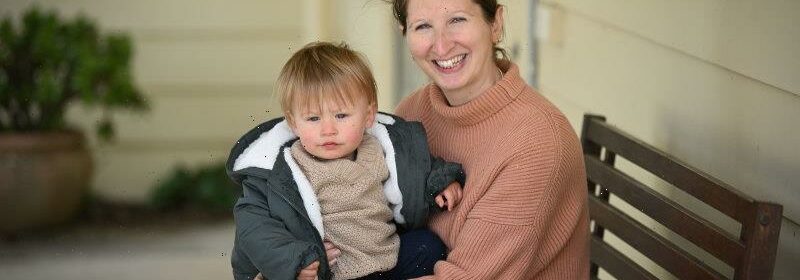Schools are desperate for teachers, and Emma wants to work but who will care for her son?

With widespread teacher shortages, new mum Emma Andrews is ready to return to work in the classroom.
But with no family close to home in the south-west coastal town Apollo Bay and long waiting lists for childcare, the English teacher has no one to care for her 15-month-old son, Albert.
Emma Andrews in Apollo Bay with her 15-month-old son Albert. She wants to return to work an English teacher but has struggled to access childcare.Credit:Eddie Jim
“It’s just really tricky because I’m part of that workforce that wants to go back,” she said.
“It’s that equity and access to childcare that doesn’t exist.”
The 37-year-old is one of many regional Victorian residents facing challenges accessing early learning services due to staff shortages.
According to the National Skills Commission, job vacancies in Victorian childcare centres and kindergartens have soared from 389 in March 2006 to 1753 in September 2022.
The shortages have knock-on effects. Seventy per cent of Apollo Bay businesses are operating on reduced hours or services due to workforce shortages, according to the local chamber of commerce.
Director of the Mitchell Institute education and health policy think tank Peter Hurley recently found four neighbourhoods in Apollo Bay were “childcare deserts”, with more than three children vying for one place.
The seaside hamlet about 190 kilometres south-west of Melbourne has a population of about 1800, but that swells to 15,000 during summer holidays, with expensive rentals and short-term leases pricing locals out of the housing market.
Marie Sinclair, who runs Apollo Bay Child Care Services, said she would buy properties to house her staff if she could.
Emma Andrews with son Albert (left), Jess McKenry with son Mason, and Stephanie Goodlet with daughter Frankie in Apollo Bay.Credit:Eddie Jim
Her centre could once accommodate 48 children, but now has only 24 places because it cannot get enough staff.
“We’ve had many who accept the job and then can’t find rentals … then we are left in the lurch,” she said.
Stephanie Goodlet’s daughter, Frankie, has been on a childcare waiting list for more than five months.
Stephanie Goodlet, with daughter Frankie, who has been on a waiting list for childcare for more than five months.Credit:Eddie Jim
At one stage, Goodlet said, a primary school teacher had to run an Apollo Bay kindergarten to ensure they got funding, and a previous educator could only find affordable housing at the local backpacker hostel.
“They have run short of an educator which has seen the centre close a couple of times,” she said.
“It is a massive problem, definitely compounded down here due to COVID. A lot of people moved down here, higher-income people. It pushed the lower-income families out of the rental market.”
Jay Weatherill, director of childcare lobby group Thrive by Five, said it was difficult to attract and retain early educators in regional Australia.
“It’s a problem in metropolitan Victoria but a bigger issue in the regions,” he said.
“The idea of rolling out a subsidy and hoping services pop up across the nation has been proved to be inaccurate. I think there has to be a thorough rethink.”
Victorian Labor has committed $9 billion for 30 hours a week of free kindergarten for four-year-olds, and subsidies of up to $2500 per child in three- or four-year-old kinder from 2023. As part of the funding, the government has promised 50 government-operated early learning centres.
But early learning operators and staff have expressed concern about meeting these promises due to staff shortages and the department is yet to announce where the centres will be.
The Liberals have promised to fund free kinder and recruit and train workers from regions that lack childcare staff to alleviate the issue of housing availability. In addition to funding free three- and four-year-old kinder, the Greens are proposing $100 million for not-for-profit community-run kindergartens.
Federal Minister for Early Childhood Education Dr Anne Aly said the government was partnering with state and territory governments and working with service providers, educators, unions and sector experts to “find lasting solutions”.
Make the most of your health, relationships, fitness and nutrition with our Live Well newsletter. Get it in your inbox every Monday.
Most Viewed in National
From our partners
Source: Read Full Article


